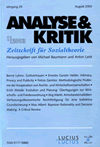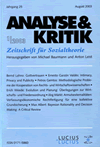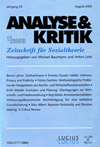Suchergebnisse
"Michael Schefczyk"
Titel: Background Justice over Time: Property-Owning Democracy versus a Realistically Utopian Welfare State
Autor: Michael Schefczyk
Seite: 193-212
Abstract: In Justice as Fairness, Rawls presents a case for property-owning democracy (POD) which heavily depends on a favourable comparison with welfare state capitalism (WSC). He argues that WSC, but not POD, fails to realise ’all the main political values expressed by the two principles of justice’. This article argues that Rawls’s case for POD is incomplete. He does not show that POD is superior to other conceivable forms of WSC. In order to present a serious contender, I sketch what I call a realistically utopian welfare state (RUWS) that (a) guarantees the fair equality of political liberties and opportunity and that (b) maximises the situation of the worst-off via a kind of participation income. The main aim of the article is to give credibility to the claim that RUWS is not obviously worse than POD by Rawlsian standards and therefore deserves a fair hearing in further research.
Titel: Comment on Michael Schefczyk
Autor: Fabian Schuppert
Seite: 213-217
In Search of a Just Political Economy: Why We Should Go beyond Rawls's POD and Schefczyk’s RUWS
Abstract: This commentary challenges Michael Schefczyk’s proposal for a realistically utopian welfare state (RUWS). As it stands, RUWS says too little about the concrete measures it will offer to avoid political domination and harmful inequalities. Moreover, RUWS follows Rawlsian Property-Owning Democracy (POD) by being silent on crucial issues such as banking regulation, the governance of investments and the issue of actual control over capital. Ultimately, it therefore seems that RUWS does not present an attractive alternative to POD since it suffers from very similar problems and shortcomings as POD.
Titel: Altruism and the Indispensability of Motives
Autor: Mark S. Peacock / Michael Schefczyk / Peter Schaber
Seite: 188-196
Abstract: In this paper we examine Fehr's notions of "altruism", "strong reciprocity" and "altruistic punishment" and query his ascription of altruism. We suggest that, pace Fehr, altruism cannot be de ned behaviourally because the de nition of altruism must refer to the motives of actors. We also advert to certain inconsistencies in Fehr's usage of his terms and we question his explanation of altruism in terms of 'social preferences'.
Titel: Four Charges Against the WTO
Autor: Mark S. Peacock / Michael Schefczyk / Peter Schaber
Seite: 275-284
Abstract: My comment on the third chapter of Peter Singer's One World consists of two parts. In the first, I criticise a common but simplistic approach to the issue of economic globalisation. This approach presumes that charges against the WTO can be translated - more or less directly - into charges against current development trends of the global economy. The WTO is not the only institution that legally structures the global economy, nor are decisions of the GATT or WTO panel necessarily reliable indicators of the major trends in the ever more integrated world market. It is, moreover, far from clear whether competition between jurisdictions leads to a 'race to the bottom'. In the second part of the paper, I (i) criticise the idea of a general conflict between 'the market' and 'democracy'. (ii) I defend the WTO's consensus rule against Singer's charge of being 'a very strange view of democracy' and try to make its benefits clear.

Property-Owning Democracy
2013 (35) Heft 1
Guest-Editors: Francis Cheneval / Christoph Laszlo
Editorial
In recent years, ’property-owning democracy’ (POD), defined by widespread ownership of productive assets, has become one of the key-factors in the assessment of the institutional design implied in John Rawls’s theory of justice. The wider implications of this inquiry also engage scholars who do not subscribe to Rawls’s conception of justice but are broadly interested in normative questions of political economy and the basic structure of a just polity. In the course of this debate, the in...

Ernst Fehr on Human Altruism. An Interdisciplinary Debate
2005 (27) Heft 1
Editorial
In the foregoing decade, two related developments in the behavioural sciences have drawn the attention of social scientists, particularly economists. The first is the use of laboratory experiments in the investigation of human behaviour. Although the use of such experiments has a longer history, only in the last decade has ’experimental economics’ become a sub-discipline of economics with which economists of just about all colours are familiar; indeed, experimental results regularly feed int...

Philosophical and Methodologial Issues in Economics
2004 (26) Heft 2
Guest-Editors: Mark S. Peacock / Michael Schefczyk
Editorial
The 'dismal science of economics', as it was once called, has a mixed reputation. Some praise its clarity and elegance whilst others bewail its futility; others laud the precision of its mathematical form whereas others still descry the source of its irrelevance and unrealism in just this form. Many feel that precision and mathematisation are bought at a price too high, namely unrealistic assumptions, empty models with little or no explanatory power, unreliable predictions and a general state of...

Legitimationsprobleme der Globalisierung
2003 (25) Heft 2
Editorial
Im Jahr 2000 entsprach der Anteil aller grenzüberschreitend gehandelten Waren und Dienstleistungen mehr als einem Viertel des weltweiten Angebots, während es noch 1970 nur etwa 10% waren. Zugleich 'globalisierte' sich in rapider Geschwindigkeit der Aktionsradius vieler Unternehmen. Allein im Jahr 2000 investierten diese Unternehmen 1,3 Billionen Dollar über Grenzen hinweg. Gemessen an ihren Umsätzen ist inzwischen eine Gruppe von etwa 15 Unternehmen kapitalstärker als die 60 ärmsten Staate...